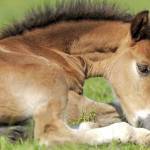Raising an Orphan Foal: Tips

When a foal’s dam dies or is not able to nurture her offspring for any reason, care and feeding of the youngster must be handled another way. Finding a nurse mare that will raise the foal is the best solution, as this maternal substitute will provide socialization as well as nourishment. If a nurse mare can’t be found, the humans who take responsibility for the foal’s welfare need to think of the same goals: a well-nourished young horse that is respectful of people and also is able to relate socially to other horses.
The tendency of humans is to treat the young foal as a pet, allowing a lot of bodily contact and even sleeping in the foal’s stall. Certainly the foal needs lots of loving care, but handlers need to establish limits from the beginning. Mares don’t allow biting and kicking from their foals, and human handlers must enforce the same rules. Punish inappropriate behavior by delivering a sharp slap to the shoulder with the flat of the hand. Loudly tell the foal “no” or “bad,” and walk away. Don’t worry if the foal acts a little scared or sulky; he’ll get the message. Screaming and physical abuse are not called for, just firm, consistent discipline.
Tiny foals may need to be bottle-fed for a while, but the sooner the foal can be trained to drink from a bucket or shallow pan, the better. Mare’s milk substitutes are available and are the ideal product for young horses. Mixes designed for calves or other animals are not suitable for foals, as they typically contain types of protein and sugar that foals are not able to utilize.
Socialization with other horses is vital, and should be kept in mind at every stage of an orphan foal’s care. If a nurse mare is not used, having horses in adjoining stalls is a good start. As early as possible, the foal should begin some turnout time with a mature horse. An older, quiet gelding is often pressed into service for this job. He will provide companionship and teach the foal the body language that is used to establish herd hierarchy. As soon as the foal is weaned, he should be turned out with other weanlings to complete this social education.








